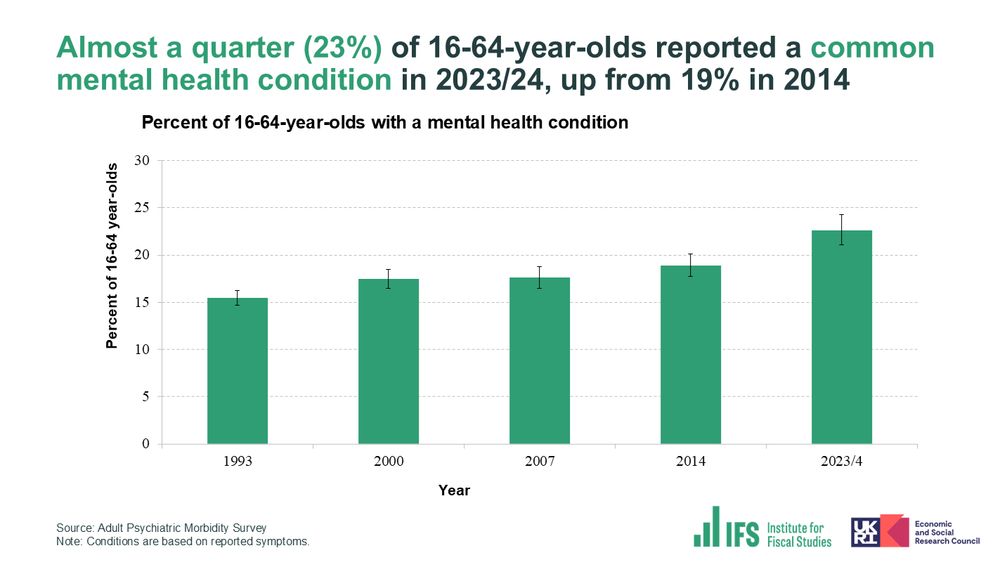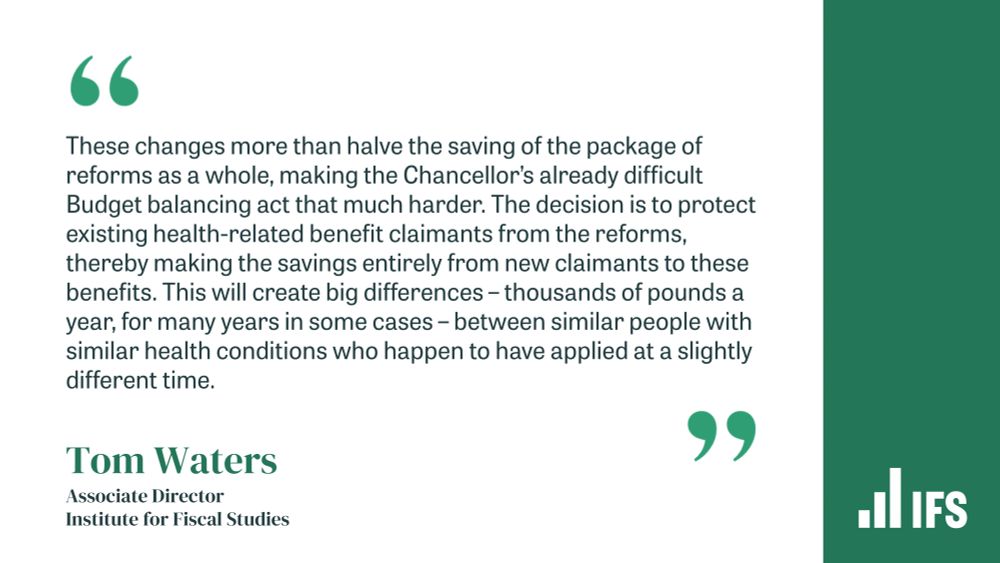Given inflation has been higher than forecast, this is surprising - even VAT receipts, which one might expect to rise with inflation, are below forecast

Given inflation has been higher than forecast, this is surprising - even VAT receipts, which one might expect to rise with inflation, are below forecast
📗 Read our report, funded by @jrf-uk.bsky.social and @healthfoundation.bsky.social, here: ifs.org.uk/publications...

📗 Jonathan Cribb, @heidikarj.bsky.social, @eduinlatimer.bsky.social, Sam Ray-Chaudhuri and Tom Waters examine the impact of four cuts to benefits in the 2010s [THREAD:🧵]:

📗 Jonathan Cribb, @heidikarj.bsky.social, @eduinlatimer.bsky.social, Sam Ray-Chaudhuri and Tom Waters examine the impact of four cuts to benefits in the 2010s [THREAD:🧵]:
This is one of the most cost-effective levers the government has to achieve a quick reduction in child poverty, given the high poverty rates among larger families.
#Budget2025

This is one of the most cost-effective levers the government has to achieve a quick reduction in child poverty, given the high poverty rates among larger families.
#Budget2025
#Budget2025

#Budget2025

📗 @beeboileau.bsky.social and Jonathan Cribb's new report examines health, wealth and employment in the run-up to the state pension age: [THREAD]

📗 @beeboileau.bsky.social and Jonathan Cribb's new report examines health, wealth and employment in the run-up to the state pension age: [THREAD]
50% of children with most severe needs aged 15 were not in work, education or training (NEET) aged 22.
Improving outcomes for this group is vital if gov wants to cut NEET rate
There is very little evidence on how systems of support could improve these long-term outcomes.

50% of children with most severe needs aged 15 were not in work, education or training (NEET) aged 22.
Improving outcomes for this group is vital if gov wants to cut NEET rate
THREAD on @eduinlatimer.bsky.social, @lukesibieta.bsky.social and Darcey Snape's IFS Green Budget chapter, funded by @nuffieldfoundation.org:

THREAD on @eduinlatimer.bsky.social, @lukesibieta.bsky.social and Darcey Snape's IFS Green Budget chapter, funded by @nuffieldfoundation.org:
This point is especially important.

This point is especially important.
Despite the two-child limit substantially reducing larger families' incomes, our new research finds it had no effect on the school readiness of affected children:
[THREAD:🧵]

Despite the two-child limit substantially reducing larger families' incomes, our new research finds it had no effect on the school readiness of affected children:
[THREAD:🧵]
@eduinlatimer.bsky.social and @matthewoulton.bsky.social discuss trade-offs involved when designing transitional protections for benefit cuts & what it means for recent benefit reforms:
ifs.org.uk/articles/whe...

@eduinlatimer.bsky.social and @matthewoulton.bsky.social discuss trade-offs involved when designing transitional protections for benefit cuts & what it means for recent benefit reforms:
ifs.org.uk/articles/whe...

Read Tom Waters, @eduinlatimer.bsky.social and Matt Oulton's new briefing here: ifs.org.uk/articles/cha...

Read Tom Waters, @eduinlatimer.bsky.social and Matt Oulton's new briefing here: ifs.org.uk/articles/cha...

Tom Waters, @eduinlatimer.bsky.social and Matt Oulton discuss some of the government's options: ifs.org.uk/articles/opt...

Tom Waters, @eduinlatimer.bsky.social and Matt Oulton discuss some of the government's options: ifs.org.uk/articles/opt...
Read Tom Waters, @eduinlatimer.bsky.social and Matt Oulton's new report: ifs.org.uk/publications...

Read Tom Waters, @eduinlatimer.bsky.social and Matt Oulton's new report: ifs.org.uk/publications...
@lgadenne.bsky.social and Bobbie Upton’s new briefing demonstrates how emissions from electricity are taxed much more heavily than emissions from gas:
[THREAD]

@lgadenne.bsky.social and Bobbie Upton’s new briefing demonstrates how emissions from electricity are taxed much more heavily than emissions from gas:
[THREAD]
This is worrying as people may base retirement and saving decisions on incorrect information. Short thread👇
@heidikarj.bsky.social's new Pensions Review briefing looks at people's state pension age awareness: [THREAD]

This is worrying as people may base retirement and saving decisions on incorrect information. Short thread👇
Matt Oulton and Tom Wernham's new briefing examines how they changed the UK's welfare system and their legacy: ifs.org.uk/articles/how...

Matt Oulton and Tom Wernham's new briefing examines how they changed the UK's welfare system and their legacy: ifs.org.uk/articles/how...
Read our briefing on the new household incomes data for 2023–24 released this morning: ifs.org.uk/articles/new...

Read our briefing on the new household incomes data for 2023–24 released this morning: ifs.org.uk/articles/new...

